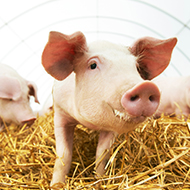Four scientists receive European PRRS Award 2022

“The European PRRS Research Award brings science and veterinary practice together" - Markus Hammer, Boehringer Ingelheim.
Scientists from across four European countries have been honoured by Boehringer Ingelheim for their practical work to improve pig health.
Diedrich Hendrickx of the Netherlands and Merel Postma from Belgium join Emil Lagumdzic from Austria and Arnaud Lebret of France in receiving the European PRRS Award 2022.
Now in its ninth year, the award encourages research into novel methods of tackling Porcine Reproductive and Respiratory Syndrome (PRRS) and developing new practical strategies for its control.
Markus Hammer, global head of swine at Boehringer Ingelheim, said: “The European PRRS Research Award brings science and veterinary practice together and promotes work that makes a difference for swine practitioners and their animals. We are pleased that the PRRS Award is so well received, and we are glad to support the promotion of excellent scientific work that has high value for practice."
PRRS affects growing piglets and adult pigs and leads to reproductive failure in breeding stock and respiratory tract illness. The virus also imposes a significant financial burden on swine producers across the globe: In the European Union alone, the total cost to the industry is estimated at 1.5 billion EUR annually.
To encourage new PRRS control methods, Boehringer Ingelheim awards three outstanding research proposals 75,000 EUR in total every year.
This year, the independent jury awarded Diedrich Hendrickx and Merel Postma for developing an ADKAR change management model to wean piglets free of PRRS wild-type virus and understand the farmer's objection towards a PRRS-free future. The aim of this project is to coach the farm on how to set up and follow an individual PRRS control plan.
Jury members awarded Emil Lagumdzic for the gene expression profiling of peripheral blood mononuclear cells and CD8+ T cells from gilts after PRRSV infection. Scientists hope that an improved understanding of the role of immune responses can enable the targeted development of efficacious vaccines.
Finally, Arnaud Lebret received the award for a descriptive study on PRRSV detection by qPCR in blood samples collected in positive stable herds following mass vaccination of sows with an MLV vaccine.
Boehringer Ingelheim states: 'Objectifying the frequency of detection of vaccine strains would help practitioners in their choice when implementing vaccinal strategies against PRRSV.'



 The RCVS has announced a new version of its 1CPD mobile app, with enhanced features for veterinary surgeons and veterinary nurses to record their continuing professional development.
The RCVS has announced a new version of its 1CPD mobile app, with enhanced features for veterinary surgeons and veterinary nurses to record their continuing professional development.